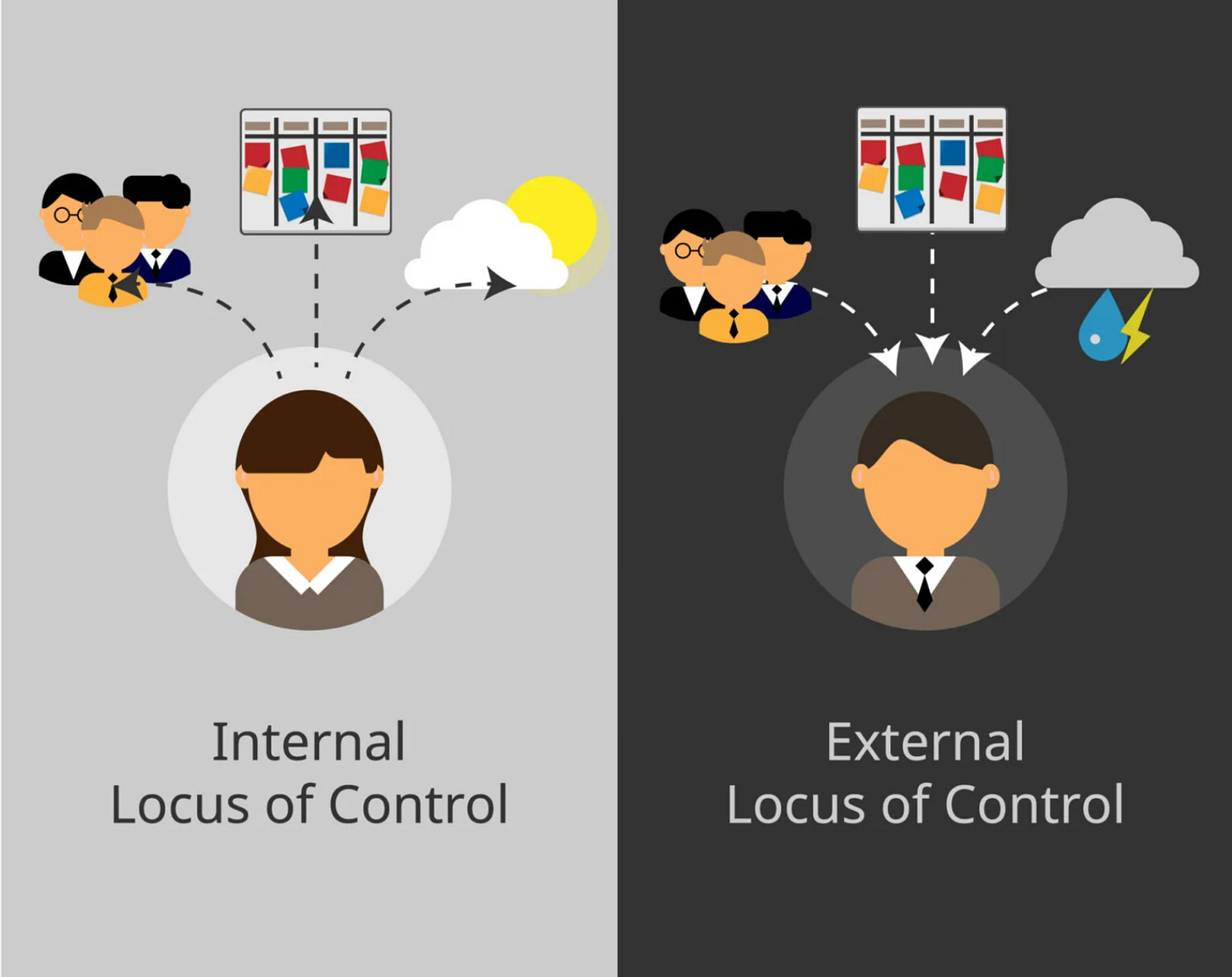The Science Behind a 'Can Do' Attitude
"Whether you think you can, or you think you can't — you're right." — Henry Ford
Since childhood, I've observed that many people view their lives as a massive, immovable sculpture of marble. In this worldview, only a fortunate few possess a chisel to shape their destiny, and even then, they often struggle to use it effectively. They focus on rules and constraints, believing the world is unchangeable and beyond their control.
In contrast, I've always seen life as a vast canvas, where everyone holds a brush and paint is readily available. Each person can leave their mark, using acrylics, oil, or watercolour as they please. I focus on opportunities.
I dwell in possibility.
— Emily Dickinson
Self-help gurus might say my environment had a fixed mindset, while I have a growth mindset. This concept, popularised by coaches and self-help authors, is supported by scientific research.
Locus of control
Anything is negotiable, or at least changeable. Check-out is at 11am? Maybe you can be the exception. Not getting the raise you deserve? Change jobs. Not happy with your social circle? Move where you belong. There are many more things within our control than we think. But it’s easier to complain and do nothing about it.
Psychologists call this internal locus of control.
Locus of control is how much individuals perceive that they themselves have control over their own actions as opposed to events in life occurring instead because of external forces. It is measured along a dimension of “high internal” to “high external”.
— Julian B. Rotter
A person with a strong internal locus of control feels in command of their life, whereas someone with a strong external locus of control believes they are subject to luck and external circumstances. Although reality includes aspects of both perspectives, our locus of control is a significant trait that can predict many outcomes.
For example, people with an internal locus of control tend to perform better academically and professionally. They believe their efforts directly influence their success, which keeps them motivated in their pursuits.
Thinking you’re in the driver seat makes you more emotionally stable and less stressed. High internals are less likely to experience anxiety and depression because they feel more in control of their lives. They tend to be rebels too, resisting social pressures to conform or obey. They feel responsible for their actions and are more likely to act independently.
In contrast, high externals present challenges in their academic and professional lives, are more stressed overall, and more likely to be obedient and submit to authorities.
The takeaway here is clear: embrace an internal locus of control.
Self-Efficacy
Self-efficacy refers to an individual's belief in his or her capacity to execute behaviours necessary to produce specific performance attainments.
— Albert Bandura, 1977
In other words, self-efficacy measures to what extent you think you can achieve something. As you can imagine, self-efficacy is closely related to the concept of locus of control, and it’s also a strong predictor of meaningful outcomes.
For example, students high on self-efficacy are much more likely to nail their exams than their peers. It is the strongest single predictor of college students' academic achievement and performance among nine commonly researched psychosocial constructs.
Similar to internal locus of control, a higher self-efficacy is associated with better job performance and higher motivation in the workplace, too.
When it comes to health, self-efficacy predicts better self-management of chronic diseases, quitting smoking, alcohol use control, healthy eating habits, pain control, and exercising regularly.
How to improve on these traits
Locus of control
It’s been shown that cognitive training makes people more likely to adapt an internal locus of control. It makes sense. If you’re more capable or you know more things, you’re better suited to have control over your life. This means being a life-long learner, learning new things well beyond formal education.
Besides this, I haven’t found other tips backed by research to improve your locus of control. It’s an innate trait, though it can be influenced by our care-takers in childhood and our early environment. If your parents encourage you to be independent and praise you when you do well, you’re more likely to develop an internal locus of control.
Some sources claim that celebrating small wins, focusing on solutions, or taking responsibility for your actions can help you shift your locus of control. But I didn’t find any scientific evidence to support this. In my eyes, it could help, but if your default locus of control is external, chances are you won’t switch it to internal so easily.
Self-Efficacy
Albert Bandura’s Social Learning Theory explains self-efficacy with 4 factors that contribute to its development:
Experience: this is the most influential factor. If you’re experienced in a task, it’s likely your self-efficacy will be higher.
Vicarious experience: if you see other people like you performing the task, you’re more likely to believe you can do it yourself too. Your self efficacy will increase as a result. This is one of the reasons why your environment is so important.
Social Persuasion: if your peers are supportive and give you realistic encouragement, you’ll be more confident in your skills. This will make you more self-efficacious than another person who’s receiving criticism.
Physiological Arousal: also known as emotional arousal, it’s another source of self-efficacy. It can be understood as how we feel about the task. Do we like it? Does it scare us? Is it pleasant? All of these factors will influence our self-efficacy, though to a smaller extent than the previous points.




I went down this rabbit hole about a month ago in the Wikipedia article about core self-evaluations, the other two being neuroticism and self esteem. I find it particularly interesting how influential interpersonal relationships can be on pushing these inborn traits around. Abusive familial, romantic, or even professional relationships can have a profound impact on how one sees themselves.
Additionally, I find an internal locus of control can be unexpectedly detrimental in the case that one takes responsibility for bad situations that are legitimately out of their control.
Anyways -- this is amazing. Thanks for publishing.
A great subject to write about. I think self-efficacy can be attained if we can develop a curious mind and the ability to say I don’t know and ask questions. It is indeed a very important internal force to do better and achieve what you want in life!